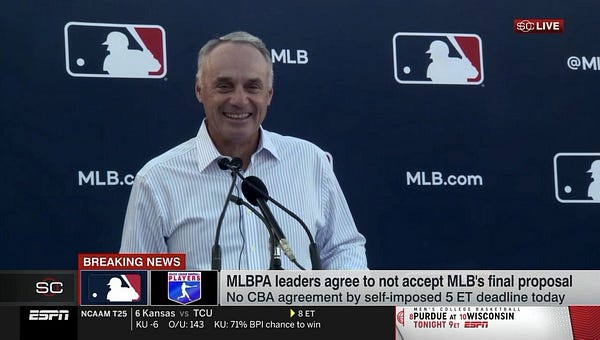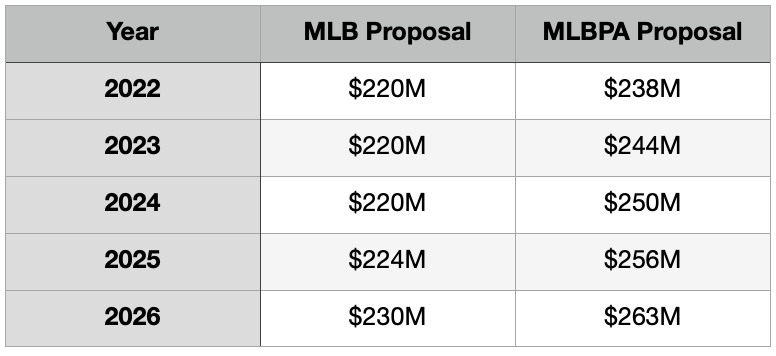Baseball slides into the void
It was avoidable. Yet inevitable.
Did you buy the optimism?
I have to admit I fell for it. The voices were so strong, even while those who knew better were warning it the gulf was still wide, that there was still much work to be done, that a deal in the amount of time left was unlikely…damnit. All I know is that after three months I wanted this deal. I wanted Spring Training. I wanted a flurry of moves to fill rosters. I wanted Opening Day.
And now? Nothing.
Major League Baseball canceled Opening Day on Tuesday. The Royals were due to open their 2022 season in Cleveland. The home opener was set for Monday, April 4 against the Chicago White Sox. Both series have been wiped off the schedule. Now the earliest the season can start is Friday, April 8 at Kauffman where the Royals are tentatively scheduled to meet the Guardians. Tentatively scheduled.
What do you do when you love a sport that clearly doesn’t love you back? Hell, I’m not even asking for love. I follow and write about the Kansas City Royals for crying out loud. Maybe just a little respect.
The owners did this. They locked out the players. They could lift the lockout and open camps at any time. If they were trustworthy sorts, the players would negotiate while the games are happening. The threat of a strike by the players would be present, certainly. But I’ve always felt that was a last resort sort of thing. You know, after some negotiations in not so good faith.
So here we are. We didn’t need to be here, but the owners are clearly pleased. Commissioner Rob Manfred certainly is.


On December 2nd, the commissioner said this:
"Simply put, we believe that an offseason lockout is the best mechanism to protect the 2022 season. We hope that the lockout will jumpstart the negotiations and get us to an agreement that will allow the season to start on time."
The owners didn’t submit a proposal until mid-January.
After minimal back and forth up to the last week, things finally took an air of…urgency? Things really picked up on Monday night.

The commissioner is such a swell guy.
The true schism is found in the so-called competitive-balance tax. This was a device that, when implemented, was meant to point all teams on the path to competitiveness. It was envisioned as a “breakaway spending mechanism.” Yes, a soft cap, but one where the smaller-market teams could come within shouting distance of their big city brothers. Instead, it has acted as a de facto hard cap without a corresponding salary floor. The MLBPA has always insisted that a salary cap is a non-starter for them. Don’t even attempt to bring it up because it’s not going anywhere with them. Yet they unwittingly agreed to one.
The thing about collective bargaining (and life, really) is that when one door is opened, it can be difficult to pull it shut. The owners love the CBT. It has but some serious curbs on spending in that the level has dropped by about four percent in the last five to seven years. So the players are forced to try to work around it. Which means steady and meaningful increases in an attempt to get that total spending back up. Last year, the CBT threshold was $210 million.
You can see the owners really want to basically freeze the cap. Especially over the next few years. The players, meanwhile, are looking for substantial increases. Their lowest threshold number of $238 million is eight million more than the owner’s highest. That’s a significant gap, but not one that can’t be overcome by some good-faith negotiating.
Speaking of which… From Sportsnet.ca. The quote is from Toronto Blue Jays player representative Ross Stripling:
As Monday turned into Tuesday and talks continued late into the night, some players got the impression owners were underestimating them.
“It got to be like 12:30 and the fine print of their CBT proposal was stuff we had never seen before,” Stripling said. “They were trying to sneak things through us, it was like they think we’re dumb baseball players and we get sleepy after midnight or something. It’s like that stupid football quote, they are who we thought they were. They did exactly what we thought they would do. They pushed us to a deadline that they imposed, and then they tried to sneak some shit past us at that deadline and we were ready for it. We’ve been ready for five years. And then they tried to flip it on us today in PR, saying that we’ve changed our tone and tried to make it look like it was our fault. That never happened.”
This was the owner’s playbook from all along. Lockout the players under the ridiculous guise that it will hasten negotiations. Sit idly for the better part of three months, barely moving on any kind of bargaining point, then at the eleventh hour, start to make some moves while pushing some things that weren’t even on the negotiating table. The hope was the MLBPA would panic that they were up against a deadline and once again submit to a deal that wasn’t in their best interests.
Is this really good-faith negotiating?
Because there is this…from Baseball America:
The negotiations come against the backdrop of rising league revenues and decreasing player pay in recent years. Gross league revenues rose 30% from $8.2 billion in 2015 to $10.7 billion in 2019, the last year figures are available, according to Forbes. Player payroll, meanwhile, fell nearly 5% from a record-$4.25 billion in 2017 to $4.05 billion in 2021, according to the Associated Press. The median player salary fell 30% from $1.65 million in 2015 to $1.15 million in 2021.
The players aren’t dumb. Their representatives aren’t stupid. They have these numbers. They are aware of what’s happening. Revenues are up, despite Manfred’s protestations. Salaries are down. Nobody goes to the ballpark because some swell consortium owns the team. They go to watch Salvador Perez.
Except now we don’t get to watch Perez, his teammates and the other Royals square off against their rivals in the Central. The worst-case scenario has come to pass. There will be no Opening Day. It was preventable, yet inevitable.
Baseball always is in danger of losing fans when the games stop. And yes, there are more entertainment options vying for attention today than there were in 1994. I suspect several of you will discover the NBA, which is massively entertaining. Perhaps you’ll follow the NHL, a sport with a playoff that is so completely insane for its non-stop intensity. I’ll probably dabble in both a little more than usual in April. But when baseball returns, will you? It’s such a different game than the other professional sports. It has a rhythm, a storyline that weaves through not individual games, rather series and weeks and months. It truly benefits those who follow from the beginning, rather than jump in at the middle. Anything less than a 162 game season is a failure.
The fans have lost. The people who depend on the game for their livelihoods have lost.
Baseball has lost.
Such a sad day.


